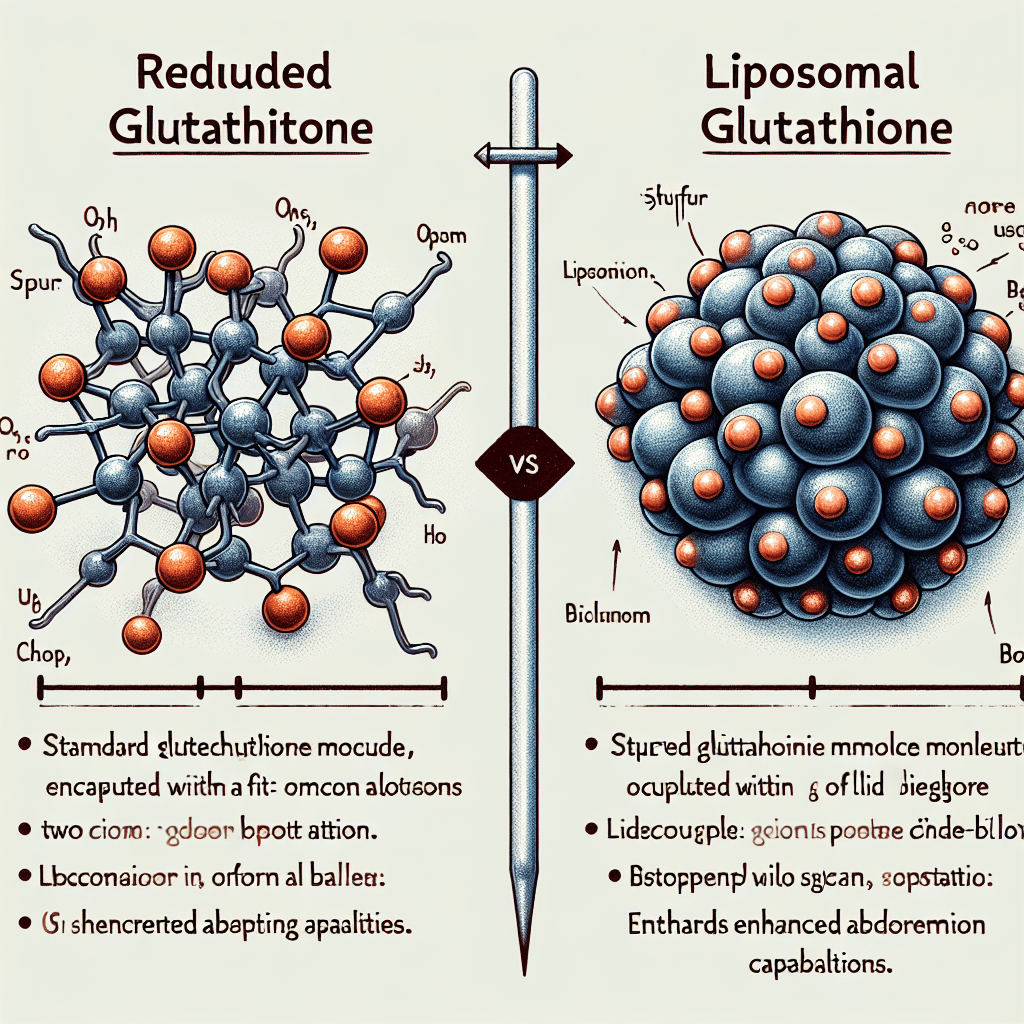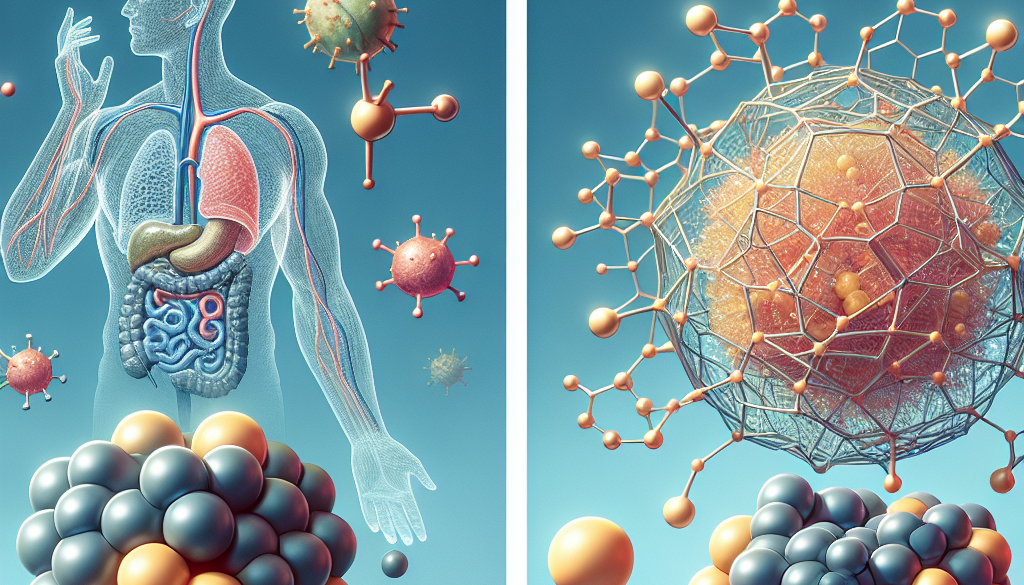Reduced Glutathione vs Liposomal Glutathione: Differences
-
Table of Contents
- Glutathione Supplementation: Reduced vs Liposomal Glutathione
- Understanding Reduced Glutathione
- Exploring Liposomal Glutathione
- Comparing Absorption and Bioavailability
- Effectiveness in Clinical Applications
- Cost Considerations
- Conclusion: Making an Informed Choice
- Discover ETchem’s Protein Products
Glutathione Supplementation: Reduced vs Liposomal Glutathione

Glutathione, often referred to as the “master antioxidant,” plays a crucial role in maintaining oxidative balance and supporting the immune system. As a tripeptide composed of cysteine, glutamic acid, and glycine, glutathione is found in every cell of the human body. Its levels can be depleted by factors such as poor nutrition, environmental toxins, and stress. To counteract this, many people turn to glutathione supplementation, which comes in various forms, including reduced glutathione and liposomal glutathione. Understanding the differences between these two forms is essential for making an informed decision about supplementation.
Understanding Reduced Glutathione
Reduced glutathione, also known as L-glutathione or GSH, is the active form of glutathione that is capable of donating electrons to neutralize free radicals. When glutathione donates an electron, it becomes oxidized and is then recycled back into its reduced form within the body. Reduced glutathione supplements aim to increase the levels of active GSH directly.
- It is the most common form of supplemental glutathione.
- Reduced glutathione is typically less expensive than other forms.
- It is available in various forms, including capsules, tablets, and powders.
Exploring Liposomal Glutathione
Liposomal glutathione is a form of glutathione that is encapsulated within liposomes—tiny, spherical vesicles made from cholesterol and naturally occurring phospholipids. This encapsulation is designed to protect the glutathione from degradation in the digestive tract and enhance its absorption into the bloodstream and cells.
- Liposomal glutathione is known for its superior bioavailability.
- It may be more effective in raising intracellular glutathione levels.
- This form is often more expensive due to the complex manufacturing process.
Comparing Absorption and Bioavailability
The primary difference between reduced and liposomal glutathione lies in their absorption and bioavailability. Oral supplementation with reduced glutathione can be less effective due to its breakdown in the stomach before it reaches the bloodstream. On the other hand, liposomal glutathione is designed to bypass the digestive process, allowing for more glutathione to be delivered directly to the cells.
- Reduced glutathione may be subject to enzymatic breakdown.
- Liposomal glutathione offers protection from stomach acids and enzymes.
- Studies suggest that liposomal delivery systems significantly increase the bioavailability of glutathione.
Effectiveness in Clinical Applications
Both forms of glutathione have been studied for their effectiveness in various health conditions. Reduced glutathione has been used in clinical settings, often administered intravenously, to treat conditions such as Parkinson’s disease and to support liver function. Liposomal glutathione, with its enhanced delivery system, has shown promise in improving symptoms of chronic diseases and boosting overall antioxidant status.
- Reduced glutathione is beneficial in acute clinical scenarios.
- Liposomal glutathione may offer more long-term therapeutic benefits.
- Research is ongoing to fully understand the potential of each form in disease management.
Cost Considerations
When choosing between reduced and liposomal glutathione, cost is an important factor. Reduced glutathione is generally more affordable, making it accessible to a wider audience. Liposomal glutathione, due to its advanced formulation, tends to be more expensive. Consumers must weigh the cost against the potential benefits of increased bioavailability.
- Reduced glutathione is a budget-friendly option.
- Liposomal glutathione represents a higher investment in health.
- Individual health goals and financial constraints will influence the choice.
Conclusion: Making an Informed Choice
In conclusion, both reduced and liposomal glutathione have their merits. Reduced glutathione is a cost-effective way to supplement this vital antioxidant, while liposomal glutathione offers enhanced absorption and potential for greater impact on health. When deciding which form to use, consider factors such as bioavailability, cost, and specific health needs. Consulting with a healthcare professional can also provide guidance tailored to individual circumstances.
Ultimately, the goal is to maintain optimal glutathione levels to support the body’s antioxidant defenses and promote overall well-being. Whether through reduced or liposomal supplementation, increasing glutathione intake can be a valuable part of a comprehensive health strategy.
Discover ETchem’s Protein Products
For those looking to complement their health regimen with high-quality protein products, ETchem offers a range of collagen-based supplements. Their products are designed to support various aspects of health, from joint function to skin vitality. With a commitment to purity and efficacy, ETchem’s offerings can be an excellent addition to a balanced diet and healthy lifestyle.
About ETChem:
ETChem, a reputable Chinese Collagen factory manufacturer and supplier, is renowned for producing, stocking, exporting, and delivering the highest quality collagens. They include marine collagen, fish collagen, bovine collagen, chicken collagen, type I collagen, type II collagen and type III collagen etc. Their offerings, characterized by a neutral taste, instant solubility attributes, cater to a diverse range of industries. They serve nutraceutical, pharmaceutical, cosmeceutical, veterinary, as well as food and beverage finished product distributors, traders, and manufacturers across Europe, USA, Canada, Australia, Thailand, Japan, Korea, Brazil, and Chile, among others.
ETChem specialization includes exporting and delivering tailor-made collagen powder and finished collagen nutritional supplements. Their extensive product range covers sectors like Food and Beverage, Sports Nutrition, Weight Management, Dietary Supplements, Health and Wellness Products, ensuring comprehensive solutions to meet all your protein needs.
As a trusted company by leading global food and beverage brands and Fortune 500 companies, ETChem reinforces China’s reputation in the global arena. For more information or to sample their products, please contact them and email karen(at)et-chem.com today.




